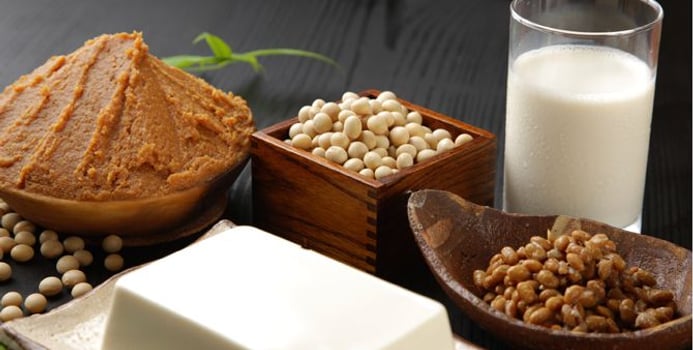Having enough vegetables in your diet is crucial for a number of factors. They are highly dense in nutrition with a low calorie count while providing you with a whole range of essential vitamins and minerals that are needed to maintain your basic cell metabolism and strengthen your immune system. Unlike fish, meat and dairy, vegetables are not considered by many to be great sources of protein. Most vegetables can only provide 1 or 2 grams of protein for every cup. This becomes a problem, especially if you are a vegetarian, because the daily recommended intake of protein is 0.36 grams for every pound of body weight. Fortunately, certain vegetables do have substantial protein levels and can act as great substitutes for animal proteins. Below are the top five sources of vegetable proteins.
1. Soybeans
Soybeans are perhaps the No. 1 source of vegetable protein you can find. Each cup of cooked soybeans can provide you with 29 grams of protein. Cooking soybeans takes a long time and you may not always find them in their raw form. But remember they are hidden in products like tofu and soy milk.
2. Lentils
Lentils are seeds belonging to the legumes family. They are very dense in nutrition, rich in fiber, folate, vitamin B1, and iron as well as protein. Each cup of lentil can provide you with about 18 grams of protein, including many essential amino acids like isoleucine and lysine. They can be made into soups and are often included as part of a vegetarian diet.
3. Beans
Black beans, kidney beans and garbanzos are also members from the legumes family. They have slightly lower protein content compared to lentils--about 13 grams per cup. Cooking mature beans normally takes about two hours, but if you have a pressure cooker, this process can be finished within 15 minutes. You can also buy them precooked and canned, but those are usually high in salt and preservatives. Green beans also belong to the bean family, but they are not ripe and are not so rich in protein.
4. Peas
Peas also belong to the legumes family and can generally provide 9 grams of protein for every cup of peas. Black-eyed peas contain the highest protein level within this category, at about 11 grams of protein per cup. In addition to being rich in protein, peas also contain a great variety of essential vitamins and minerals, especially thiamine, folate, niacin, phosphorous and zinc, which are vital to cell growth and development. Frozen peas are widely available and are very versatile cooking ingredients.
5. Artichokes
Artichokes are flower-shaped green vegetables originally from southern Europe and the Mediterranean. They are prepared by first removing the thorny stem, and then cut into large quarters and either boiled or steamed until tender. Artichokes are low in calories, high in fiber and can give you about 6 grams of protein per cup cooked.



